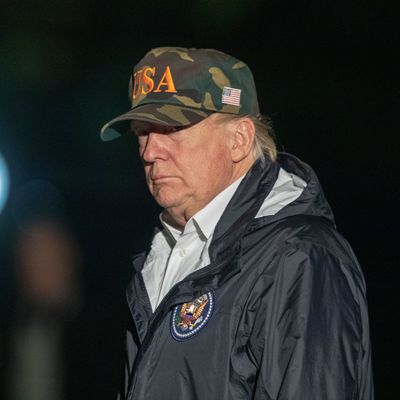
Most of the public fascination surrounding the legal ordeal of President Trump has attached itself to whether (or, more accurately, how successfully) his campaign colluded with Russia. Much less attention has fixated on the question of Trump committing obstruction of justice in office.
This isn’t because obstruction is less serious an offense. Quite the opposite: It’s the very crime that drove President Nixon from office. Rather, it’s paradoxically because the obstruction is so public and naked that it’s been robbed of its mystery. The collusion question has enough hidden tangents to create some compelling drama about the outcome, even if the basic contours are clear. Collusion is more interesting than obstruction for the same reason that the romantic travails of Ross and Rachel are more compelling than those of two people in a porno.
But obstruction is still sitting right there. The latest reminder comes in the form of an analysis in the legal blog Lawfare co-authored by James Baker, who until late 2017 served as general counsel of the FBI. The putative subject of the piece is the Watergate “road map,” which detailed Special Prosecutor Leon Jaworski’s grounds for impeaching Nixon. But the real subject of the analysis is Trump, whose offenses appear strikingly similar.
Baker plumbs the road map for details of how Nixon interfered with the Department of Justice’s investigation into the Watergate burglary (which, of course, led to the Oval Office). Nixon had repeated contact with Assistant Attorney General Henry Petersen in order “to gather intelligence about an ongoing criminal investigation in which he was personally implicated.” Nixon also appeared to dangle possible job promotions before Petersen while he was wheedling information out of him.
Baker (along with his co-author, Harvard Law student Sarah Grant) notes that this pattern of behavior amounted to an impeachable offense: “When the president sought information from Petersen, provided his views to Petersen on the various matters that they discussed, and discussed Petersen’s future, he was not merely exercising his powers under Article II of the Constitution to supervise the executive branch and trying to get the facts necessary to do so; the president of the United States was also acting as a criminal co-conspirator trying to obstruct lawful investigative activities of the Justice Department.”
Now, Baker is not saying Trump did the same thing. But he’s not not saying it, either. Having spent a year at the FBI during Trump’s tenure, Baker might be well-positioned to know if Trump did open some back-channel communications to interfere with the Mueller investigation. And both the editor and the managing editor who published are dropping heavy hints that Baker is not just publishing random historic ruminations for no reason:
Obviously, those of us on the outside can’t know what Trump may have done in secret. But we do know that he is rather fond of obstructing justice. Trump fired James Comey after, according to Comey, telling him to go easy on the first target in the Russia investigation and attempting to secure Comey’s personal loyalty. He then casually confessed on television that he did this over the Russia investigation. He then repeatedly demanded his Attorney General stop the investigation (again, in public!).
Then Trump replaced Sessions with Matt Whitaker, a hack who had proclaimed Trump’s innocence. Despite reports showing Trump had met with Whitaker more than a dozen times (and discussed the Russia investigation with him), Trump rather suspiciously told reporters that he does not know Whitaker. Even more suspiciously, he claimed to have knowledge of the “inner workings” of the Mueller investigation.
In the context of all of the above, it’s fairly striking that somebody who worked at the FBI during some of this period is writing historical essays about a president who used his contacts with a Department of Justice staffer to interfere in an investigation into his own conduct. It is also striking that this person highlights the role of the president dangling a possible promotion to the official he was working, given that Trump has given a huge promotion to Whitaker. At minimum, the sorts of crimes committed by Nixon and described by Jaworski in his memo seem like the kind of thing Trump would do.
For all the obstruction that’s lying around in plain sight, there may be more to be revealed by Robert Mueller.






























